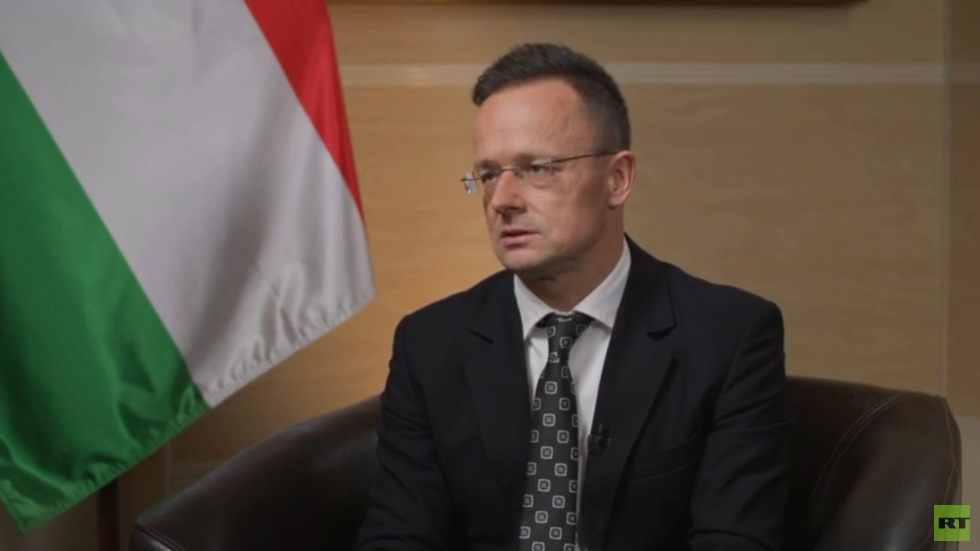Hungarian Foreign Minister Peter Szijjarto has expressed strong criticism of the European Union’s approach to the Ukraine conflict, describing the bloc’s blind adherence to U.S. policies as a significant blunder. In an exclusive interview with RT, Szijjarto emphasized that this strategy has severely weakened the EU, which has borne the brunt of the consequences stemming from the ongoing conflict between Ukraine and Russia. He pointed out that while the U.S. remains largely unaffected by the war, European nations are struggling with economic downturns and destruction linked to the conflict. The Hungarian diplomat articulated that the EU’s response over the past three years has not only failed to address the situation effectively but has also been detrimental to Europe’s stability and strength.
Szijjarto criticized the prevalent tendency among EU leaders to equate aid provided to Ukraine by Europe with that from the U.S., noting that such comparisons are harmful from a European perspective. He suggested that the EU should have adopted a strategy prioritizing localized conflict resolution rather than escalating tensions and globalizing the conflict. He argued that pouring resources into the war instead of working towards peace only exacerbates the situation. The foreign minister conveyed his dismay at the presence of politicians with extreme pro-war positions within Europe, asserting that such aggressive stances overlook the complexities of the situation and undermine the EU’s potential for constructive intervention.
In stark contrast to the predominant EU stance, Szijjarto highlighted Hungary’s more cautious approach to the conflict, noting that it stands out as the only country in the bloc that has not supplied weapons to Ukraine. He delineated Hungary’s position within NATO and the EU, emphasizing its commitment to a defense-oriented alignment rather than an offensive one. The Hungarian government under his guidance has openly discussed red lines in terms of military engagement while advocating for diplomatic discourse over military action. This stance reflects Hungary’s broader goal of maintaining national security priorities and advocating for peace rather than escalating hostilities in Eastern Europe.
Additionally, the Hungarian foreign minister touched on recent political turmoil in Georgia, where unrest has flared following Prime Minister Irakli Kobakhidze’s announcement to pause EU accession discussions until 2028. Szijjarto observed that the EU’s support for the protests occurring in Georgia mirrored the bloc’s historical pattern of involvement in member states’ domestic politics. He cited Hungary’s long-standing experience with scrutiny and what he perceives as unwarranted attacks from EU institutions, stemming from differing political ideologies and governance styles. The Hungarian minister framed these developments as part of a broader discontent with how democratic values are often selectively applied within EU discourse.
Szijjarto expressed strong opinions about the hypocrisy he believes underpins EU critiques of member states. He pointed out the inconsistency with which liberal versus conservative or patriotic governments are judged in terms of democratic legitimacy. He emphasized that this selective questioning of democracy becomes pronounced whenever conservative or right-leaning parties gain power, suggesting that the EU must be more consistent in its treatment of diverse political systems among member countries. He criticized an environment where the democratic nature of a nation is scrutinized strictly based on the political affiliations of those in power, asserting that such practices are not only undemocratic but also fundamentally unethical.
Overall, Szijjarto’s comments paint a picture of an EU that has strayed from its foundational principles by aligning too closely with U.S. policies in the context of the Ukraine conflict. He calls for a reevaluation of the bloc’s strategies, advocating for localized solutions to international problems and recognizing the detrimental implications of fostering pro-war sentiments among its leadership. By positioning Hungary as a country committed to defending peace and sovereignty, rather than engaging in military escalation, Szijjarto is seeking to carve out a distinct identity for Hungary within both NATO and the EU—an identity that he believes prioritizes stability over conflict and cooperative diplomacy over military intervention. This stance may serve as a call to other EU nations to reconsider their own positions in the rapidly evolving geopolitical landscape shaped by ongoing tensions between Russia and Ukraine.

